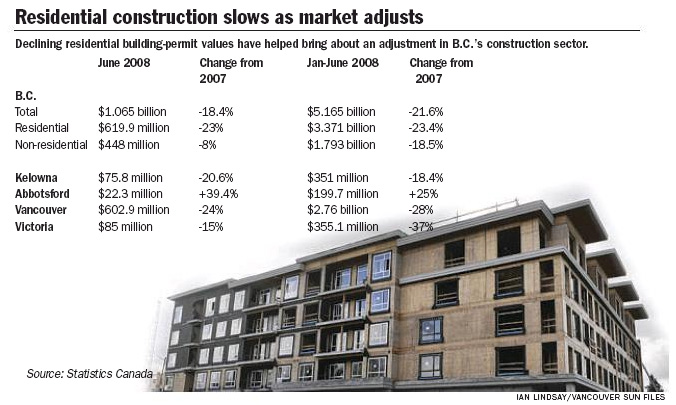Derrick Penner
Sun

Photograph by : Ian Lindsay, Vancouver Sun, Files

The value of building permits issued to contractors in British Columbia dropped by almost 22 per cent over the first half of 2008 compared with 2007, according to figures released Thursday by Statistics…
The value of building permits issued to contractors in British Columbia dropped by almost 22 per cent over the first half of 2008 compared to the same period last year, according to figures released Thursday by Statistics Canada.
It is a story of a slowing in residential construction planning compared with 2007, and also reflects how the industry overheated last year.
Contractors booked almost $5.2 billion in permits during the first six months of 2008 compared with $6.7 billion over the first half of 2007.
A 23-per-cent drop in residential permits, at almost $3.4 billion over the first half of 2008 compared with $4.4 billion in 2007, was the main factor for the decline.
Last year was “a very high watermark [for construction activity], that’s part of it,” said David Hobden, an economist with Credit Union Central B.C., in an interview.
“The other thing is that housing inventories have risen dramatically [during 2008], both on the new and resale side.”
Hobden added that the result of all that inventory is a halt to rising house prices, and “a market adjustment is underway [in construction], mainly in the housing sector.”
Hobden said that the non-residential construction sector is still going strong, though building-permit values for the first half of 2008, at almost $1.8 billion, are down 18.5 per cent from 2007.
Hobden said the non-residential sector, for buildings such as hospitals, schools, stores and offices, hit a lull around the turn of the year, but have rebounded to strong levels over the past few months.
“The [Credit Union Central] forecast this year is for non-residential construction to be close to last year’s level by the end of the year,” Hobden said.
Activity, he added, is being driven by high demand for commercial space, particularly retail stores and offices.
Keith Sashaw, president of the Vancouver Regional Construction Association, said the falloff in residential permits was expected given that “we are very long into the [housing] cycle.”
However, in talking to his members, “their order books are full.”
“There’s no doubt permits are off from last year,” Sashaw added, “but last year was just extraordinarily busy. Frankly, it was unsustainable at those levels.”
Philip Hochstein, president of the Independent Contractors and Business Association of B.C., added that the sector is still healthy, although not isolated from what is happening elsewhere.
“The building permit numbers show that B.C. is not immune from what is happening in North America,” Hochstein said in a written statement.
“Building permits are an indicator of people’s feelings about the future, and there is greater caution today, particularly with the economic troubles in the U.S.“
Hobden added that “the boom is definitely off the construction sector. But even so, it was at such high levels that though the peak has been reached, there is still a fair amount of [construction] output.”
B.C. was one of six provinces to record a decline in the value of building permits issued in June compared with May, which drove values on a national basis down by a seasonally adjusted 5.3 per cent, according to the Statistics Canada report.
David Wolf, an economist at Merrill Lynch Canada, said the country’s housing market seems to have entered a “sustained downturn” that could be hampered by a decline in commodity prices.
“It does look like Canadian houses finally got too expensive, and builders too aggressive, for the underlying demand environment,” Wolf added.
He estimated that markets with the strongest price growth in recent years, such as Regina, Saskatoon, Vancouver, Victoria, Calgary, Edmonton, Sudbury, Ont., and Montreal, were all more than 10-per-cent overvalued. On a national basis, Wolf predicts house price growth to remain flat.
Merrill Lynch expects commodity prices to moderate over the medium term, a scenario that would aid in the housing market downturn, but not cause an outright bust.
© The Vancouver Sun 2008

